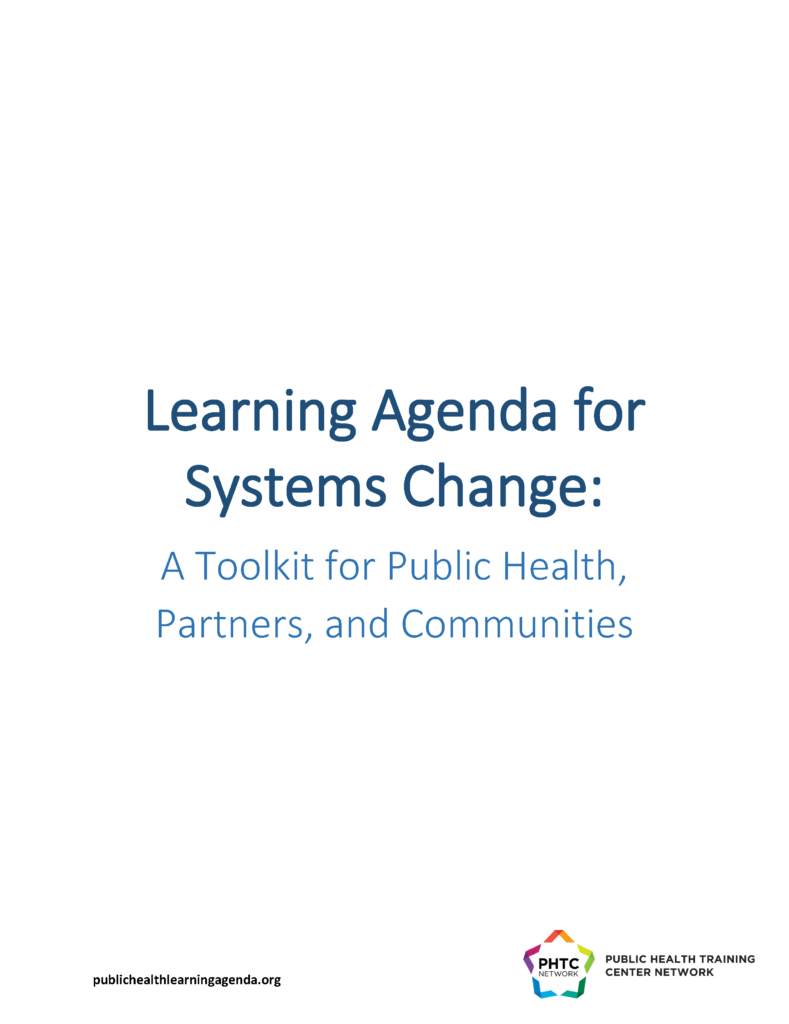
Watch the Launch Webinar Recording!
This one-hour webinar recording describes the context and rationale for the Learning Agenda for Systems Change (LASC), provides a high level overview of the five-phase framework, and covers potential applications.
Request a Consultation
Do you have questions about the Learning Agenda for Systems Change? Want to explore how your agency might utilize it? Sign up for a 30-minute Zoom call to get your questions answered or to kick off a more in-depth consultation.
Announcing the LASC Toolkit 2.0!
We are happy to announce the launch of the Learning Agenda for Systems Change: A Toolkit for Public Health, Partners, and Communities. This 2025 Toolkit is the 2.0 version of the Learning Agenda Toolkit originally released in 2020.

Creating a Learning Agenda for Systems Change
Watch this short video to learn how the Public Health Learning Agenda for Systems Change harnesses the power of learning to address persistent challenges that impact health in our communities.
The Learning Agenda
for Systems Change
Use transformative learning as a driver for systems change
We are happy to announce the launch of the Learning Agenda for Systems Change: A Toolkit for Public Health, Partners, and Communities. This 2025 Toolkit is the 2.0 version of the Learning Agenda Toolkit originally released in 2020. The new version has been updated based on pilot testing, use cases from the field, and input from expert reviewers.
The LASC Toolkit 2.0 features a five-phase framework and associated resources to help teams and their partners – regardless of level of experience with systems change – develop learning strategies that address complex problems.

What's inside the Learning Agenda for Systems Change (LASC) Toolkit 2.0?

Section 1 includes a description of the foundational concepts behind the LASC, an overview of the LASC Framework, and tips on how to use the LASC process
Section 2 is a practical guide for completing the five phases of developing a Learning Agenda
Section 3 includes a worksheet (template + completed sample), resources, and references
Who should use the LASC Toolkit 2.0?
The LASC Toolkit 2.0 was designed for workforce development professionals, community health and strategic planners, and other public health leaders and their partners. Whether you’re just learning about systems change or are an experienced systems change leader, the LASC Toolkit 2.0 provides a process, tools, and resources to help guide your thinking.
Why the Learning Agenda for Systems Change? Why now?
Public health teams and their partners face many complex challenges that stand at the root of community health issues.
Existing public health workforce development models focus largely on improving individual competency. Individual competency alone, however, is no longer sufficient to create a workforce equipped to address the current adaptive challenges occurring at the individual, organizational, community, and systems levels.
Transformative collective learning for systems change is important because it’s not just about making changes in how we think, but in how we think together. To really change systems, we need to learn and share ideas in a way that connects us socially. Rather than a workforce development plan for individual positions and functions, we need an agenda that serves as a living document for groups of diverse people to learn about, experiment with, and reflect upon collaborative actions focused on policy and systems approaches alongside the thinking and behavior needed to implement them.
The Learning Agenda for Systems Change was developed by the Public Health Training Center Network and the Policy, Practice and Prevention Center at the University of Illinois Chicago School of Public Health.
Citation
Welter C, Davis S, Kulik P, Lloyd L, Todd Barrett K, Walter C. Learning Agenda for Systems Change: A Toolkit for Public Health, Partners, and Communities. Public Health Training Center Network & University of Illinois Chicago Policy, Practice and Prevention Research Center; 2025. doi: 10.25417/uic.28700372



